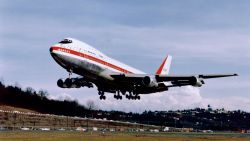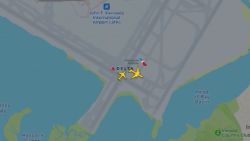Story highlights
NEW: A U.S. official tells CNN the ban could be reinstated
NEW: Official also says Israel shared new information about defense capabilities
Israel had been lobbying Washington to reverse FAA decision
The United States has lifted its ban on U.S. carriers flying to and from Tel Aviv, Israel.
The Federal Aviation Administration’s move came Wednesday night, a day and a half after it imposed the prohibition over security concerns amid renewed Mideast violence. Airlines moved quickly to restore service.
Delta Air Lines, United Airlines and US Airways said Thursday they are resuming flights to Israel’s busiest airport, Ben Gurion International.
The European Aviation Safety Agency also has reversed its recommendation that airlines avoid flying to Ben Gurion.
Israeli officials, including Prime Minister Benjamin Netanyahu, lobbied Washington to reverse the extraordinary order the FAA put in place after a Hamas rocket struck close to the airport Tuesday.
Many international airlines followed suit, canceling flights to and from Tel Aviv.
The FAA said it had worked with other U.S. government agencies and officials to assess security in Israel and “carefully reviewed” new information and measures Israel was taking to “mitigate potential risks to civil aviation.”
Two U.S. officials said Thursday the facts on the ground in Tel Aviv are the same as they were before the FAA freeze was put into place, but Israel has shared more information about airport defenses.
A State Department official said “the circumstances in Tel Aviv from 72 hours ago are no different than the circumstances now.”
Another U.S. official cautioned that people in Washington are keeping a close eye on the situation in Tel Aviv and “if this goes south the ban could go back into place.”
Sources told CNN that the FAA, the U.S. intelligence community and other government agencies have been in intense discussions with Israel since the ban was put into the place.
“There was significant new information about the threat – new information/intelligence about the threat which they took into account, which led to the rescinding of this notice, and also measures – new measures the government of Israel put in place to mitigate potential risks to civilian aircraft and aviation,” State Department spokeswoman Marie Harf said Thursday.
But the U.S. official said lifting of the ban “was not so much new intelligence as much as it is a better understanding of the planes going into and out of the airport.”
The Israelis improved certain protocols and procedures after the ban and were able to share new information with Washington about their defense capabilities that convinced the United States to resume air service into Israel, the official said.
“We had a higher comfort level with the way they proposed to mitigate the threat we were seeing and it was satisfactory enough to allow airliners to resume,” the official said.
While U.S. airlines operate only a handful of flights per day to Israel, FAA safety directives are influential worldwide and can affect future bookings.
Air Canada said it would start flying to Israel again Thursday night, according to its verified Twitter account.
Spain’s Iberia Airlines also announced that it would resume flying to Ben Gurion. “We are operating this flight with a bigger plane than we usually fly: an Airbus A330 with 278 seats,” double the usual capacity, an Iberia spokeswoman said via e-mail.
British Airways never stopped its twice-daily flights, it said.
The Lufthansa Group, which includes Austrian Airlines and Swiss International Air Lines, has canceled flights through Friday.
Ban openly questioned
The FAA ban was openly questioned by the Israeli government and sharply criticized by some high-profile U.S. political figures.
They included former New York Mayor Michael Bloomberg, who flew to Tel Aviv and made his point bluntly on CNN, and Sen. Ted Cruz, a Texas Republican, who said he believed the step was imposed to pressure Israel into a cease-fire.
But Antony Blinken, the deputy White House national security adviser, insisted to CNN’s Wolf Blitzer that politics played no role in the decision.

“We didn’t use the FAA to do anything. The FAA makes independent judgments for safety and security of our airline passengers and for our airlines,” Blinken said. “They made a judgment, and we’re not in the business of second-guessing the FAA or overturning what they do.”
Also speaking to Blitzer after flying to Israel on its flag carrier, El Al, Bloomberg said the FAA ban had been a mistake.
“We certainly don’t want to stop flights into airports in America,” he said. “It would be devastating for America. It’s devastating for Israel when you stop flights.”
Unrest in Ukraine, Israel raises travel tension
Many flights soar over conflict zones
Planning on going to Israel? Share your story
CNN’s Aaron Cooper, Carma Hassan, Rene Marsh and Mike Ahlers contributed to this report.























